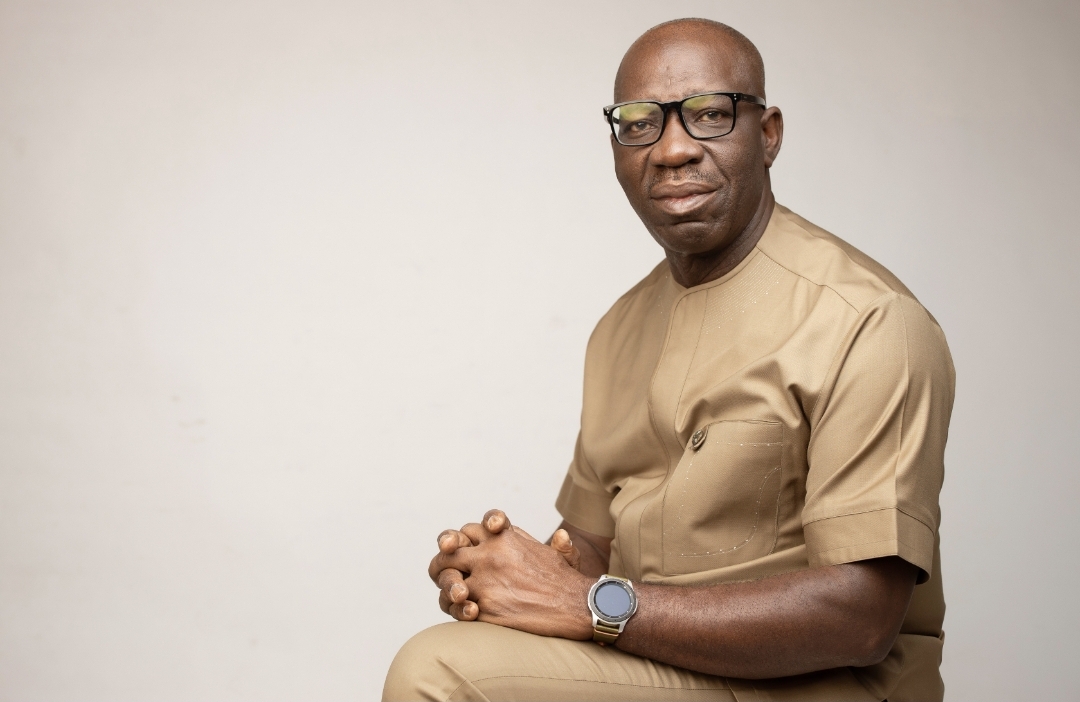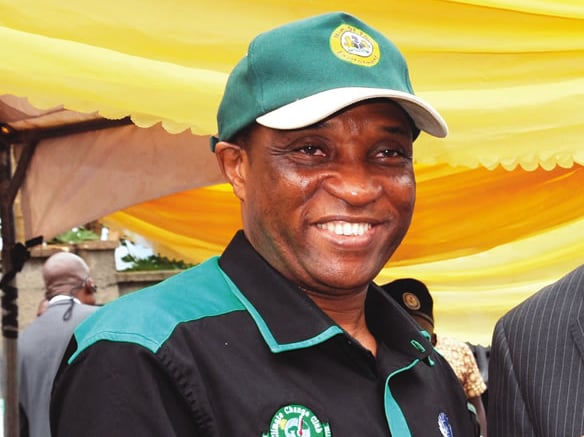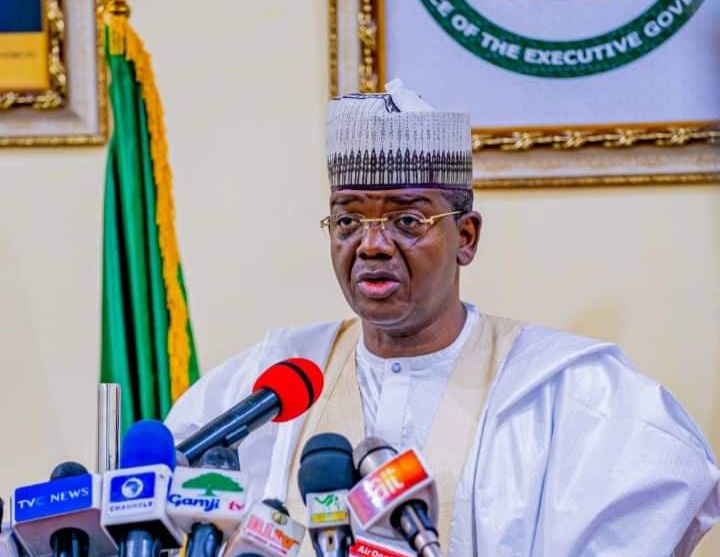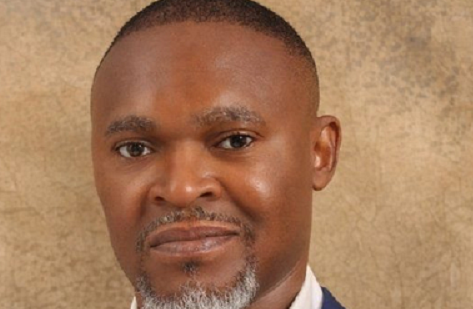On a first meeting, he would not seem to you like much.
Extremely unassuming, prim and proper. To classify him as a perfect gentleman hardly does justice to the description of his mien.
Unfortunately, in a society where bruteness is celebrated as a hallmark of leadership and shameful conduct hailed as glorious, a Godwin Nogheghase Obaseki, until you actually get to know him well, will most likely not be taken seriously.
Sometime in 2018, less than a year after he picked me to be his Special Adviser, Media and Communication Strategy, I was walking towards the gate which borders his office and coincidentally his innocuous convoy of just three vehicles drove into the car porch. He stepped down dressed in his usual smart suit. As he saw me walking towards the gate, he beckoned and I approached him. I wished him a good afternoon, he responded and then asked, ‘Crusoe are you free later in the evening?’ I responded, yes sir, and he said please let us have a meeting once you are ready.
Advertisement
It was the first of such interactions I had had with him and it set me thinking.
From what I had known about many powerful and successful men, it was a relatively unusual way to engage your staff.
First, he greets me with genuine interest in my wellbeing and then he asks if I was free to meet him?
Advertisement
This sort of attitude elicits different reactions from different kind of people. For me, having studied leadership from a largely unconventional institution, the church, I immediately knew that this was not the kind of man to take for granted.
Power can be vicious but power under firm control can change the world. After that day, I kept watching this man who clearly understood the enormity of power in his custody but was not even minutely intoxicated by it. He carried this huge power with so much grace and humility. This is exactly the kind of man to be revered and maybe even feared.
Conversely, however, in a broad segment of the political space in Nigeria, such individuals are perceived to be weak. Many in our local political space consider might to be right and rudeness as the currency for measuring the sense of dominance and primacy.
I once had a casual conversation with a security personnel, who incidentally was the Chief Security Officer to Governor Obaseki at the time. He was trying to draw my attention to what he believed was one of the possible precursors of all the political battles that the governor had to fight during his first term in office.
Advertisement
According to him, it all begins with the convoy of the governor. Crusoe, you think convoys of governors and presidents are long and intimidating for fun? He asked me.
There is a psychological angle to it, he counseled. People must fear you as a governor. When a governor passes, the place should shake and people must feel the chills. This drives a sense of awe into the people and they will think twice before picking a fight with you.”
This security expert made the comment out of frustration after he had tried repeatedly without success to get this governor to fortify his convoy with bomb squads, heavy artillery and a retinue of bulletproof SUVs. I understood the dilemma of this security man but had he known Obaseki more he would have stopped trying to sell dominance and intimidation as a security strategy.
For Obaseki, simplicity is second nature. Whatever assignment he gives you to handle for him, if you cannot deliver it within the ambits of modesty and simplicity, then you have failed, because for him, it is absolutely unacceptable to display power and lord it over the very people whose mandate you stand on to provide leadership.
Advertisement
However, to take this simplicity for weakness when you engage Obaseki has proven to be a costly mistake for many otherwise, how can you explain Obaseki’s triumph over nearly all the political heavy weights in the country, who pitted themselves against his reelection in September 2020.
Comrade Adams Oshiomhole, Senator Bola Ahmed Tinubu, the Senate leadership, the House of Representatives leadership along with all their hirelings all deployed their full weight against Obaseki’s reelection and they failed woefully.
Advertisement
Oshiomhole’s self-immolation
When the story of Obaseki’s political journey is written, Comrade Adams Oshiomhole would get copious mention for the friendship the duo shared, but more so, such a treatise will highlight the high-octane ‘politricks’ that characterized their frayed relationship, which culminated in the demystifying and usurpation of the latter’s political fiefdom.
Advertisement
Obaseki became governor of Edo State in 2016, in what many people believed to be the making of Oshiomhole, as he supposedly deployed his political arsenal to ‘install’ his successor. However, the tides turned in a matter of months, resulting in one of the most dramatic political debacles in Nigeria’s fourth republic, as a political ‘lizard’ in the phrasing of Oshiomhole faced off with a political ‘giant’.
The stakes were high. Obaseki rode the storms in a manner that befuddled anyone that was conversant with the Godfather-godson squabbles that dot Nigeria’s political history. Oshiomhole had everything going well for him, or so everyone thought. He was the National Chairman of the ruling All Progressives Congress (APC), which had at the time just pulled off a political masterstroke with the ousting of the Peoples Democratic Party (PDP) at the national level. He had just completed two terms as Edo State Governor and had the political machinery in the state wrapped around his palms. While serving as governor, he had defeated the Tony Anenih political apparatchik, amassing massive followership and a reputation as a political bulwark that combined the oratory of a labour leader, the sagacity of a sage and the fame of a pop star into his ever-bubbly frame. All these were brought to bear against Obaseki in the political battle that ensued.
Advertisement
In the end, Oshiomhole not only met his match, he was outwitted by the combination of the Governor’s experience as a student of Classics with learnings from ancient philosophers and political strategists; decades of hedging risks in corporate boardrooms and an unassuming mien steeped in the fine traditions of one of the old Benin empire’s aristocratic families.
The dramatic highpoints were numerous. In one instance, Oshiomhole relied on the faulty premise of a non-existent defect in Obaseki’s academic qualification to disqualify the governor from contesting for the APC governorship ticket during a screening aired on national TV. He described himself in that instant as the Supreme Court of the APC, which had the power to make or mar the destiny of an aspirant. He taunted the governor to appeal the decision if he wasn’t satisfied with the verdict. But being quick-witted, the governor dumped the APC, and switched to the PDP for the ticket to contest in the election, a move which inspired Obaseki’s supporters to turn the episode into a sonorous pop song with the sing-along line, ‘Oga Carry Your Ticket Go’.
After the election had been won and lost, almost a year later, the Supreme Court delivered its verdict on the alleged certificate forgery saga, which quashed Oshiomhole’s preposterous posturing.
A master of political intrigues, Oshiomhole was beaten to his game by the underdog, Obaseki who built a new army of supporters, who were eternally invested in his quest to wrestle the Godfather off his high horse. From defanging political lions and tigers, demobilizing a statewide political machinery to unmasking the façade surrounding his predecessor’s enigma, Obaseki proved too slippery for all the attacks waged by Oshiomhole and his minions.
‘Edo No Be Lagos’
Another intriguing persona in Governor Obaseki’s political sojourn is the former Governor of Lagos State, Asiwaju Bola Ahmed Tinubu, a kingpin who had mastered the intrigues of Nigerian politics. Touting himself as the ‘father of democrats,’ Tinubu had schemed to stretch his political empire to Edo State, after holding sway in South West Nigeria since the turn of the century. Few days before the election, he made a broadcast that riled the emotion of Edo people against the APC candidate, Osagie Ize-Iyamu, who was Tinubu’s man Friday.
The Obaseki nut proved too hard to crack. During the run-up to the election, on the streets of Benin City, one of the most potent chants to draw hysterical reaction from the crowd was the refrain: ‘Edo No Be Lagos,’ a jibe at the kingpin in Lagos, who Edo people felt was plotting to take over their state and turn descendants of the dominant, old Benin Empire into modern-day slaves. On election day, it was not uncommon to hear crowds erupt in joyous, liberating screams of ‘Edo No Be Lagos’ when the results were announced with Obaseki leading.
The role of the Nigerian Senate in the futile efforts to unseat Obaseki is now etched in history. They had sought to take over the Edo State House of Assembly in what proved to be an abuse of legislative function, acting out a script that was hatched by the honchos in the APC. Feeling undone with the crises that resulted from the move, they were joined by the House of Representatives, in the hope that a united National Assembly could muscle the State Assembly and subsequently remove Obaseki. They met a brick wall, nonetheless, with a High Court in Port Harcourt validating the proclamation of the Assembly by Governor Obaseki. The APC National Working Committee also collapsed to the whims of Oshiomhole, who usurped their powers on his vengeful mission to remove Obaseki. These schemes came to naught, turning the Obaseki story into a legend in Nigeria’s political space.
On this July first, birthday of an unusual politician and decent Nigerian, Godwin Nogheghase Obaseki, it is with great delight and admiration that I wish him a fabulous birthday celebration.
Osagie, a journalist writes from Benin City
Views expressed by contributors are strictly personal and not of TheCable.
Add a comment







